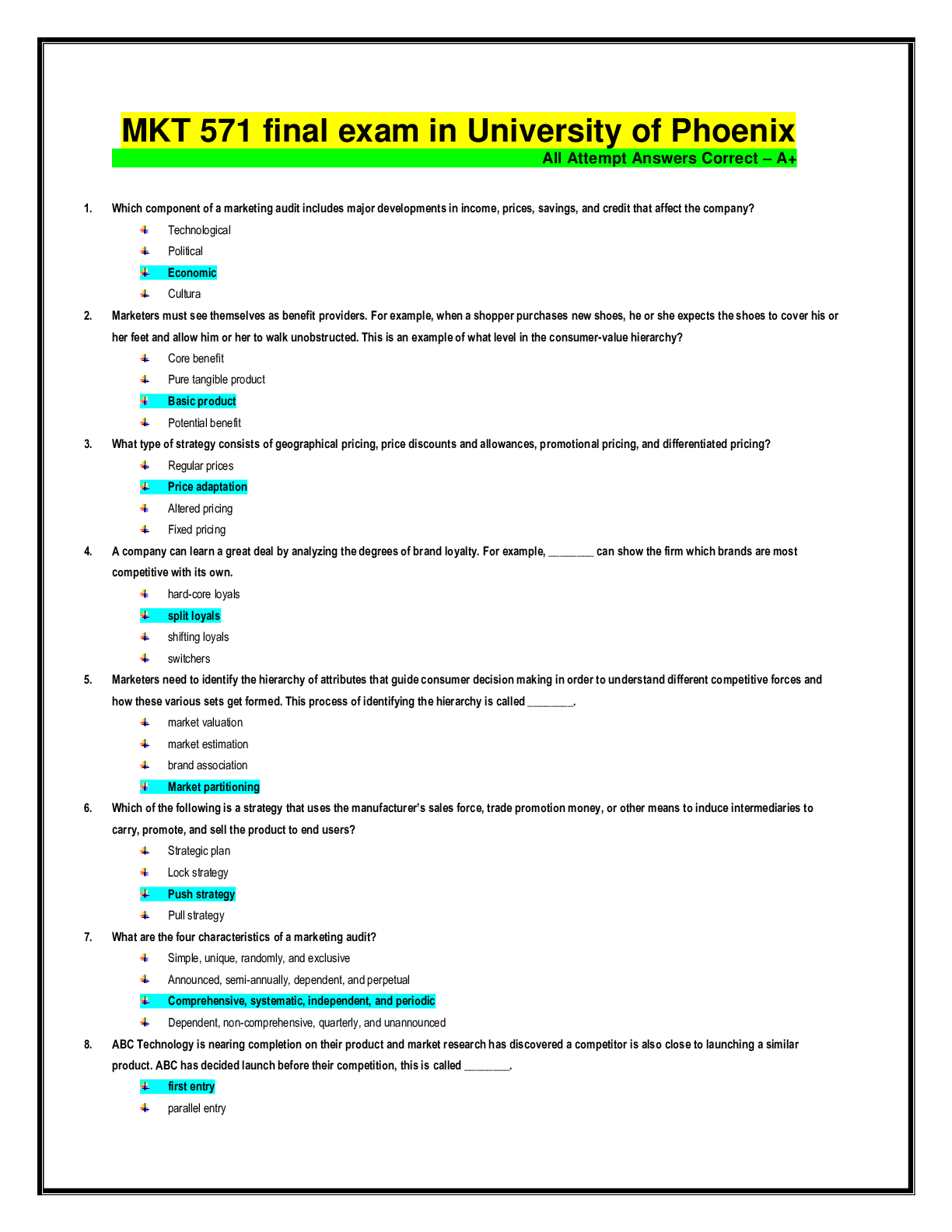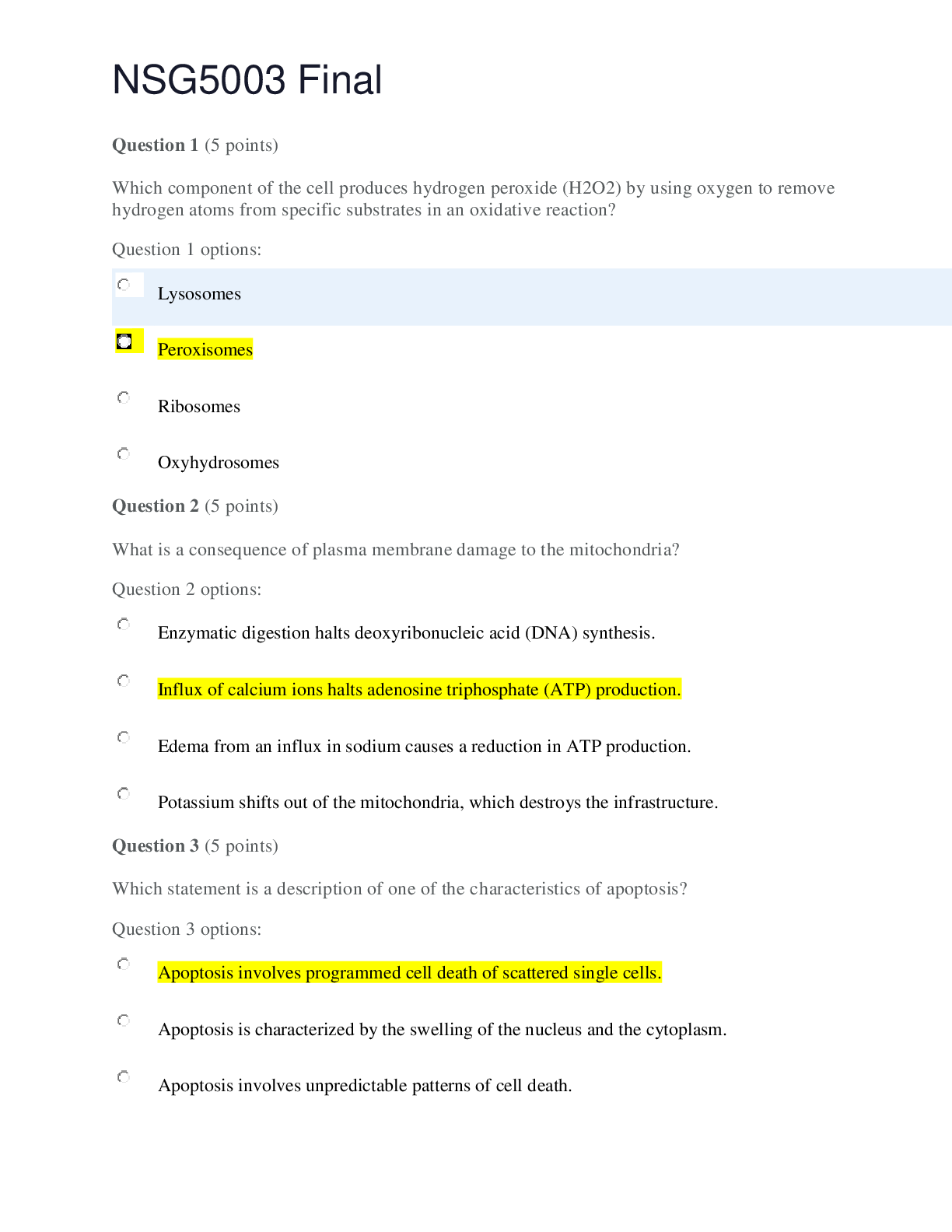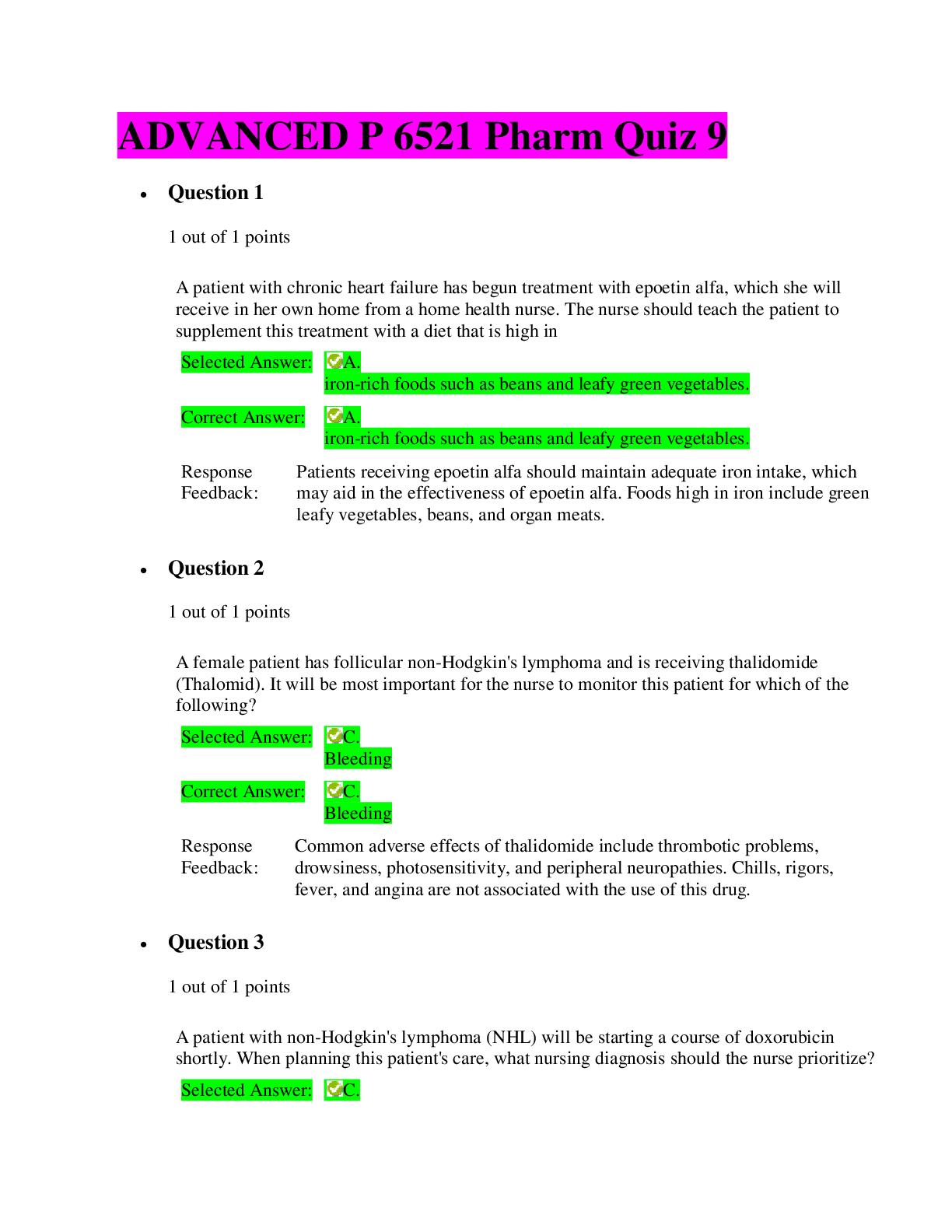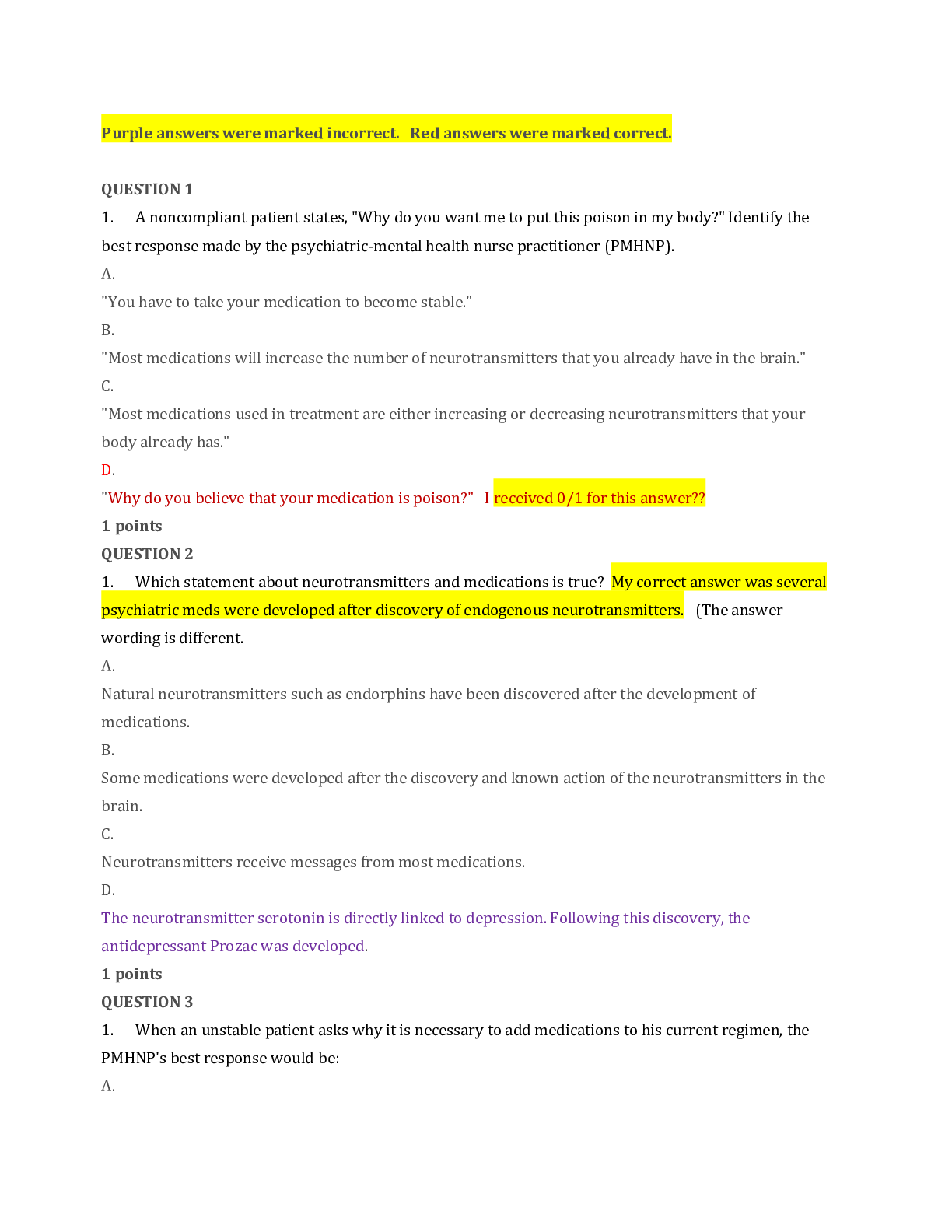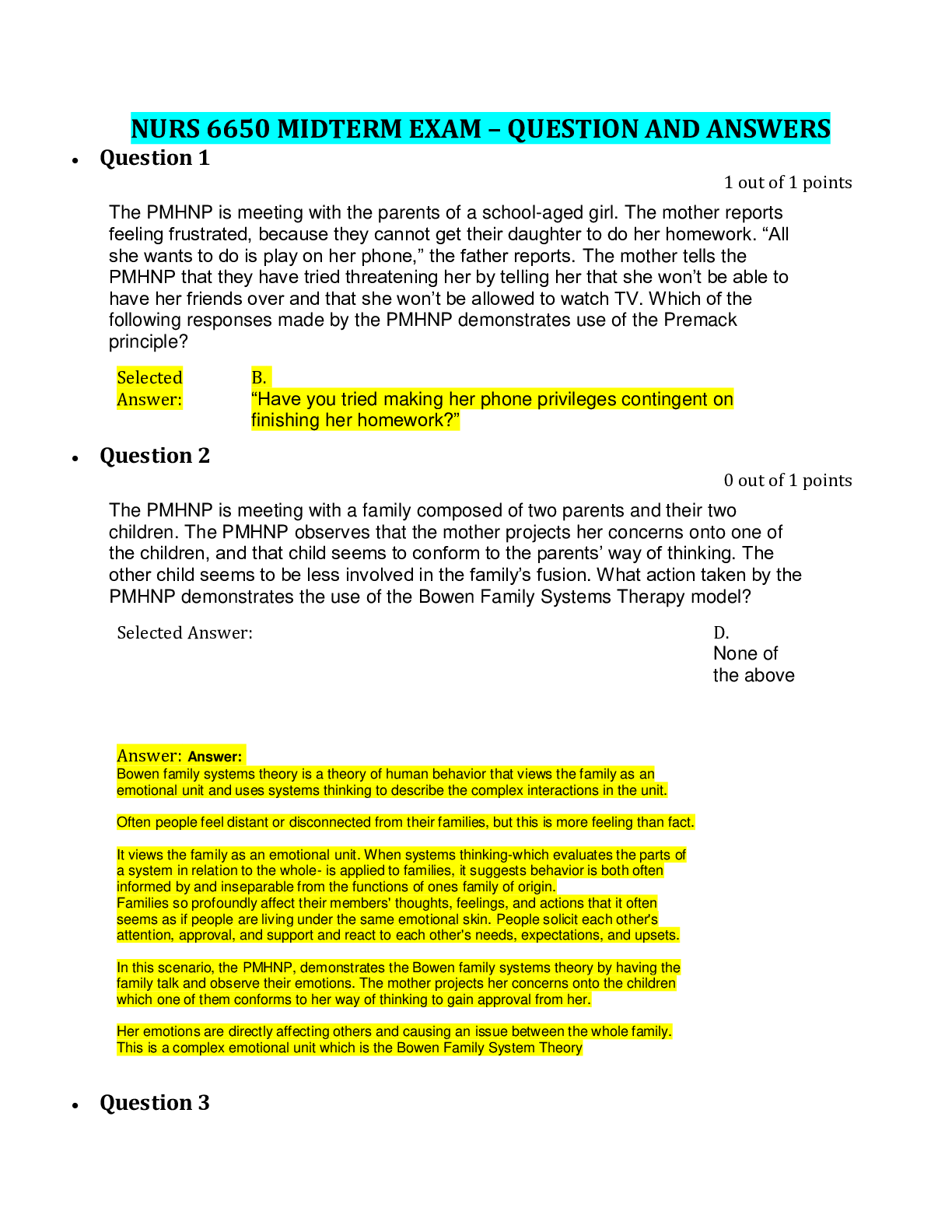*NURSING > EXAM > Nurs 6521 advanced pharmacology Quiz 1 40 Questions & Answers | Walden University (All)
Nurs 6521 advanced pharmacology Quiz 1 40 Questions & Answers | Walden University
Document Content and Description Below
Nurs 6521 advanced pharmacology Quiz 1 • Question 1 The culture and sensitivity testing of a patient's wound exudate indicates that a specific antibiotic is necessary for treatment. The United Sta... tes Pharmacopeia–National Formulary indicates that the drug in question is 96% protein bound. What are the implications of this fact? • Question 2 1 out of 1 points The nurse's assessment of a community-dwelling adult suggests that the client may have drug allergies that have not been previously documented. What statement by the client would confirm this? • Question 3 1 out of 1 points A nurse is discussing with a patient the efficacy of a drug that his physician has suggested, and he begin taking. Efficacy of a drug means which of the following? • Question 4 1 out of 1 points Tylenol 325 mg/tablet, patient needs 650 mg; how many tables should patient take? • Question 5 1 out of 1 points A patient with a variety of chronic health problems is being seen by her nurse practitioner, who is currently reviewing the patient's medication regimen. Which of the patient's medications should prompt the nurse to teach her to avoid drinking grapefruit juice? • Question 6 1 out of 1 points In order to promote therapeutic drug effects, the nurse should always encourage patients to • Question 7 1 out of 1 points A home health nurse notes that there have been changes to a patient's oral drug regimen. The nurse will closely monitor the new drug regimen to • Question 8 1 out of 1 points On the 1 a.m. rounds, the nurse finds a patient awake and frustrated that she cannot go to sleep. The nurse administers an ordered hypnotic to help the patient sleep. Two hours later, the nurse finds the patient out of bed, full of energy and cleaning her room. The nurse evaluates the patient's response to the hypnotic as • Question 9 1 out of 1 points In light of her recent high blood pressure readings, a patient has been started on a thiazide diuretic and metoprolol (Lopressor), which is a beta-adrenergic blocker. What is the most likely rationale for using two medications to address the patient's hypertension? • Question 10 1 out of 1 points A patient has a blood serum drug level of 50 units/mL. The drug's half-life is 1 hour. If concentrations above 25 units/mL are toxic and no more of the drug is given, how long will it take for the blood level to reach the nontoxic range? • Question 11 1 out of 1 points For which of the following patients would a nasogastric tube most likely be considered to aid in the administration of medications? • Question 12 1 out of 1 points A 56-year-old female patient has been admitted to the hospital with chronic muscle spasms and has been prescribed a new medication to treat the spasms. She has a poorly documented allergy to eggs, synthetic clothes, and perfumes. What is the priority action of the nurse to ensure that prescribed medication does not experience an allergic reaction? • Question 13 1 out of 1 points 5 ml = _______________tsp • Question 14 1 out of 1 points A nurse who is responsible for administering medications should understand that the goals of the MedWatch program are to (Select all that apply.) • Question 15 1 out of 1 points A patient who has ongoing pain issues has been prescribed meperidine (Demerol) IM. How should the nurse best administer this medication? • Question 16 1 out of 1 points The nurse is caring for a patient receiving an aminoglycoside (antibiotic) that can be nephrotoxic. Which of the following will alert the nurse that the patient may be experiencing nephrotoxicity? • Question 17 1 out of 1 points In which of the following patients would a nurse expect to experience alterations in drug metabolism? • Question 18 1 out of 1 points A nurse is instructing a patient concerning a newly prescribed drug. Which of the following should be included to help improve patient compliance and safety? • Question 19 1 out of 1 points Which of the following statements best defines how a chemical becomes termed a drug? • Question 20 1 out of 1 points 30 ml = _______________tbsp • Question 21 1 out of 1 points A nurse has been administering a drug to a patient intramuscularly (IM). The physician discontinued the IM dose and wrote an order for the drug to be given orally. The nurse notices that the oral dosage is considerably higher than the parenteral dose and understands that this due to • Question 22 1 out of 1 points A patient who has been admitted to the hospital for a mastectomy has stated that she has experienced adverse drug effects at various times during her life. Which of the following strategies should the nurse prioritize in order to minimize the potential of adverse drug effects during the patient's stay in the hospital? • Question 23 1 out of 1 points A patient is treated with an antibiotic for an infection in his leg. After 2 days of taking the antibiotic, the patient calls the clinic and reports that he has a rash all over his body. The nurse is aware that a rash can be an adverse effect of an antibiotic and can be either a biologic, chemical, or physiologic action of the drug, which is an example of • Question 24 1 out of 1 points A patient with a recent diagnosis of acute renal failure has a long-standing seizure disorder which has been successfully controlled for several years with antiseizure medications. The nurse should recognize that the patient's compromised renal function will likely • Question 25 1 out of 1 points An older adult patient with a history of Alzheimer's disease and numerous chronic health problems has been prescribed several medications during his current admission to hospital and recent declines in the patient's cognition have impaired his ability to swallow pills. Which of the following medications may the nurse crush before administering them to this patient? • Question 26 1 out of 1 points An 80-year-old patient has been taking lorazepam since his wife died a year ago. He has been staying with his son, but will now move to an assisted living facility. Before admission to the assisted living facility, the patient's physician has determined that the drug is no longer needed. The nurse at the facility will plan to • Question 27 1 out of 1 points A 79-year-old patient in a long-term care facility is to receive an intravenous fat emulsion. Which of the following lab values would be a priority for the nurse to assess before administration? • Question 28 1 out of 1 points Medication reconciliation of an 82-year-old man who has recently moved to a long-term care facility reveals that the man takes 1 to 2 mg of lorazepam bid prn. The nurse should recognize what consequence of this aspect of the resident's drug regimen? • Question 29 1 out of 1 points A 77-year-old woman who is 5 feet 3 inches tall and weighs 89 lbs has been admitted to the hospital with a diagnosis of failure to thrive. What action should the nurse prioritize when addressing the woman's apparent lack of nutrition? • Question 30 1 out of 1 points A nurse is caring for a 92-year-old patient who is taking multiple drugs and displaying increased cognitive impairment and memory loss. The initial action of the nurse would be to • Question 31 1 out of 1 points A nurse notes new drug orders for a patient who is already getting several medications. Which of the following is the most important consideration when preparing to administer the new drugs? • Question 32 1 out of 1 points An older adult who lives in a long-term care facility has recently begun taking losartan (Cozaar) for the treatment of hypertension. The nurse who provides care for this resident should recognize that this change in the resident's medication regimen make create a risk for • Question 33 1 out of 1 points A 72-year-old man with pain issues is being given a drug by the intramuscular route. His serum blood level concentrations have been erratic. The nurse suspects that this may be due to • Question 34 1 out of 1 points A 90-year-old frail, elderly woman has arrived at the emergency department with a broken hip and in acute respiratory distress. Succinylcholine will be used because of the need for rapid endotracheal intubation, and then the woman will be sent to surgery. Due to the woman's frail condition, she is at risk for skin breakdown. Which of the following nursing diagnoses would be most appropriate? • Question 35 1 out of 1 points A 79-year-old woman has been admitted to the hospital with a gastrointestinal bleed. She is currently receiving a transfusion of packed red blood cells as well as an infusion of pantoprazole (Protonix), a proton-pump inhibitor, to help stop her bleeding. What care setting is most appropriate for this patient? • Question 36 1 out of 1 points A 70-year-old woman is starting on an acidic drug. The nurse is aware that food and nutrient intake can affect drug excretion by changing the urinary pH. About which of the following will the nurse question the patient concerning her diet? • Question 37 1 out of 1 points A home health nurse is performing a home visit to an elderly client who has early-stage dementia. The nurse observes that some of the client's pill bottles are empty, even though the client is not due for refills for 2 weeks. What nursing diagnosis should the nurse prioritize when planning this client's care? • Question 38 1 out of 1 points An elderly man has been admitted to a residential care facility and the nurse has conducted a medication reconciliation. The man has taken numerous drugs in the past, including a course of bicalutamide (Casodex) several years earlier. The nurse recognizes this drug as being an antiandrogen and is consequently justified in presuming that the man has a history of what disease? • Question 39 1 out of 1 points A 70-year-old man with diabetes mellitus is taking metoprolol (Lopressor) to manage his hypertension. The nurse would be sure to instruct the patient to • Question 40 1 out of 1 points Mr. Lacuna is an 83-year-old resident of a long-term care facility who has a diagnosis of moderate Alzheimer disease. Mr. Lacuna's physician recently prescribed oral rivastigmine, but he was unable to tolerate the drug due to its gastrointestinal effects. As a result, he has been ordered the transdermal patch form of the medication. When administering this form of rivastigmine, the nurse should [Show More]
Last updated: 4 months ago
Preview 4 out of 18 pages

Loading document previews ...
Buy this document to get the full access instantly
Instant Download Access after purchase
Buy NowInstant download
We Accept:

Reviews( 0 )
$9.00
Can't find what you want? Try our AI powered Search
Document information
Connected school, study & course
About the document
Uploaded On
Jan 03, 2020
Number of pages
18
Written in
Additional information
This document has been written for:
Uploaded
Jan 03, 2020
Downloads
0
Views
92













